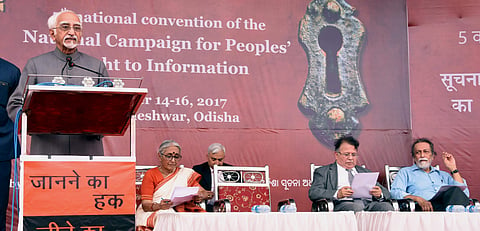

BHUBANESWAR: Former Vice-President Mohammad Hamid Ansari on Saturday criticised successive governments for hesitating to provide information and opined much of the information sought can easily be made public but are not being done, thanks to the legacy of colonial rule and closed governance.
Speaking at the fifth national convention of the National Campaign for People’s Right to Information (NCPRI) organised by Odisha Soochana Adhikar Abhiyan, a State-level network of RTI activists, here, Ansari said many information-giving agencies view the RTI Act as the right to reject, deny and obfuscate.
“It is observed that about 66 per cent of litigation in courts is about land which results in loss of GDP. If land records are updated and access made easier, it would have a positive impact on pendency and would lead to all round improvement in governance,” he said.
The question, Ansari said, always remains about the efficacy of the Act in actual implementation. A harsh reality, which cannot be overlooked, is that a number of information-seekers on sensitive issues have been threatened and some even lost their lives, he said.“Twelve years after the enactment, though officials indicate it as reasonably satisfactory, civil society views that its implementation remains inefficient and as a result, transparency and accountability seems to be under threat. Poor record-keeping practices within bureaucracy, lack of infrastructure and staff for running information commissions are cited as the reason behind this,” he observed.
The former Vice-President, however, maintained that the Act has given a new meaning to citizen engagement with governance. The culture of transparency brought about by the RTI Act has empowered the citizens and emboldened them to seek information and seek accountability, he said.
The Act is not an anti-corruption act but given the level of transparency, it can contribute to this objective. However, it depends on the functioning of information commissions which are critical to the RTI regime and must be endowed with the resources for discharging their functions efficiently, he added. Among others, while economist Prabhat Patnaik criticised the Centre for demonetisation stating that it is adversely affecting the informal sector, noted social activist Aruna Roy deliberated on different aspects of RTI Act and the challenges it has been facing. The three-day convention will conclude on Monday.